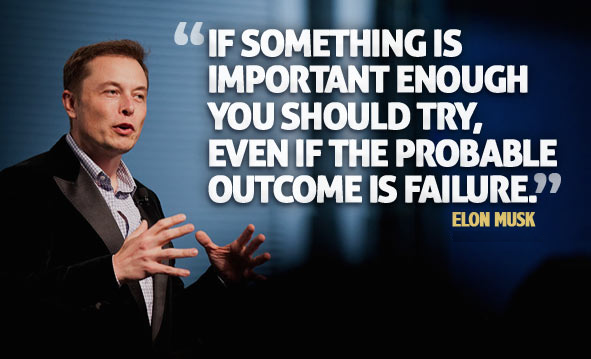Entrepreneur Spotlight: Elon Musk

Some people accidentally change the world. Others set out to change it deliberately. South African-born Elon Musk certainly falls into the latter category. One of the founders of PayPal, Musk used his fortune to create two of the most innovative companies of the early 21st century. So, how’d he do it?
How to Disrupt Established Industries and Companies
Some industries are known for being difficult to enter. The startup capital necessary to research, develop, and eventually market a product can be so expensive as to basically be impossible. Such products include automobiles, rockets, tanker ships, and anything else requiring billions of dollars and hundreds of highly skilled workers to create. Elon Musk, however, doesn’t think like most entrepreneurs. And his unique approach has created companies that are disrupting long established industries.
Learning How to Run a Business
Born in South Africa in 1971, Musk quickly developed an interest in computer programming and technology. By age 12, he sold his first program, a video game, for $500. He moved to Canada and the U.S. to complete his education, receiving bachelor’s degrees in physics and economics from the University of Pennsylvania. Though he originally intended to pursue Ph.D. at Stanford University, Musk decided he wanted to be an entrepreneur and dropped out of the program.
In 1995, using $28,000 borrowed from his father, Musk and his brother created their first company, Zip2, an online city guide licensed to newspapers. When the company was sold to Compaq for $341 million in cash and stock in 1999, Musk’s share was approximately $22 million. Later that same year, Musk created a company that would later become PayPal. His experiences at Zip2, including disagreements with the company’s board of directors, lead to more control over the new company. He was eventually forced out as CEO and accepted $165 million when PayPal was sold to eBay in 2002.
Put It On The Line for One Big Idea
With millions of dollars in his pocket and two successful companies behind him, Musk decided to do something big. And a little misguided. With little to no experience in the aerospace or rocketry industries, Musk created SpaceX, a commercial rocket company. Every aspect of SpaceX’s rockets, from design to manufacture, are handled in house. This model differs substantially from other industry players, like Boeing and Lockheed Martin. The result has been nothing but an astonishing success. SpaceX secured a $1.6 billion contract from NASA to deliver supplies to the international space station. The company is working on a replacement for the space shuttle and hopes to begin launches with actual astronauts in the next few years.
Okay, Make That Two Big Ideas
A couple of years after starting SpaceX, Musk got involved with electric car company Tesla Motors. While not an original founder, Musk ended up as CEO during the 2008 financial crisis and has held the position ever since. Since Musk took over, Tesla has become the darling of the automotive industry. Though car makers have been ignoring electric vehicles for decades (the first one was created in the early 1900s), Tesla quickly attracted attention for its development of new, economically viable technologies. To achieve this, Musk applied the same vertical integration techniques he applied at his software companies and SpaceX. As part of this, Tesla is opening a “GigaFactory” outside of Sparks, Nevada to manufacture lithium ion batteries.
On its website, the company says: “By 2020, the Gigafactory will reach full capacity and produce more lithium ion batteries annually than were produced worldwide in 2013.”
Conclusions: What to Learn from the Life of Elon Musk
Elon Musk is bringing science fiction into the real world. His bold ideas for commercial space travel, electric cars, and digital payment systems have had a profound impact. Of course, the real lesson is that big ideas are great but a plan of action is even better. Throughout his career, Musk has been pushing towards certain goals, often changing course and revising his plan along the way. This flexibility combined with a unique, long term vision helped Musk create a fortune worth $13.6 billion.
But it isn’t about the money. In 2010, it was widely reported that struggles with Tesla and SpaceX had left Musk “paper rich and cash poor”. At one point, Musk freely admits that Tesla was within hours of bankruptcy. After making his early fortune, he decided to stick to a set principles that lead him to space and alternative energy sources. In a 2007 interview, Musk said, “Going from PayPal, I thought: ‘Well, what are some of the other problems that are likely to most affect the future of humanity?’ Not from the perspective, ‘What’s the best way to make money?”

back to blog

Some people accidentally change the world. Others set out to change it deliberately. South African-born Elon Musk certainly falls into the latter category. One of the founders of PayPal, Musk used his fortune to create two of the most innovative companies of the early 21st century. So, how’d he do it?
How to Disrupt Established Industries and Companies
Some industries are known for being difficult to enter. The startup capital necessary to research, develop, and eventually market a product can be so expensive as to basically be impossible. Such products include automobiles, rockets, tanker ships, and anything else requiring billions of dollars and hundreds of highly skilled workers to create. Elon Musk, however, doesn’t think like most entrepreneurs. And his unique approach has created companies that are disrupting long established industries.
Learning How to Run a Business
Born in South Africa in 1971, Musk quickly developed an interest in computer programming and technology. By age 12, he sold his first program, a video game, for $500. He moved to Canada and the U.S. to complete his education, receiving bachelor’s degrees in physics and economics from the University of Pennsylvania. Though he originally intended to pursue Ph.D. at Stanford University, Musk decided he wanted to be an entrepreneur and dropped out of the program.
In 1995, using $28,000 borrowed from his father, Musk and his brother created their first company, Zip2, an online city guide licensed to newspapers. When the company was sold to Compaq for $341 million in cash and stock in 1999, Musk’s share was approximately $22 million. Later that same year, Musk created a company that would later become PayPal. His experiences at Zip2, including disagreements with the company’s board of directors, lead to more control over the new company. He was eventually forced out as CEO and accepted $165 million when PayPal was sold to eBay in 2002.
Put It On The Line for One Big Idea
With millions of dollars in his pocket and two successful companies behind him, Musk decided to do something big. And a little misguided. With little to no experience in the aerospace or rocketry industries, Musk created SpaceX, a commercial rocket company. Every aspect of SpaceX’s rockets, from design to manufacture, are handled in house. This model differs substantially from other industry players, like Boeing and Lockheed Martin. The result has been nothing but an astonishing success. SpaceX secured a $1.6 billion contract from NASA to deliver supplies to the international space station. The company is working on a replacement for the space shuttle and hopes to begin launches with actual astronauts in the next few years.
Okay, Make That Two Big Ideas
A couple of years after starting SpaceX, Musk got involved with electric car company Tesla Motors. While not an original founder, Musk ended up as CEO during the 2008 financial crisis and has held the position ever since. Since Musk took over, Tesla has become the darling of the automotive industry. Though car makers have been ignoring electric vehicles for decades (the first one was created in the early 1900s), Tesla quickly attracted attention for its development of new, economically viable technologies. To achieve this, Musk applied the same vertical integration techniques he applied at his software companies and SpaceX. As part of this, Tesla is opening a “GigaFactory” outside of Sparks, Nevada to manufacture lithium ion batteries.
On its website, the company says: “By 2020, the Gigafactory will reach full capacity and produce more lithium ion batteries annually than were produced worldwide in 2013.”
Conclusions: What to Learn from the Life of Elon Musk
Elon Musk is bringing science fiction into the real world. His bold ideas for commercial space travel, electric cars, and digital payment systems have had a profound impact. Of course, the real lesson is that big ideas are great but a plan of action is even better. Throughout his career, Musk has been pushing towards certain goals, often changing course and revising his plan along the way. This flexibility combined with a unique, long term vision helped Musk create a fortune worth $13.6 billion.
But it isn’t about the money. In 2010, it was widely reported that struggles with Tesla and SpaceX had left Musk “paper rich and cash poor”. At one point, Musk freely admits that Tesla was within hours of bankruptcy. After making his early fortune, he decided to stick to a set principles that lead him to space and alternative energy sources. In a 2007 interview, Musk said, “Going from PayPal, I thought: ‘Well, what are some of the other problems that are likely to most affect the future of humanity?’ Not from the perspective, ‘What’s the best way to make money?”
@LemonadeDayNational






